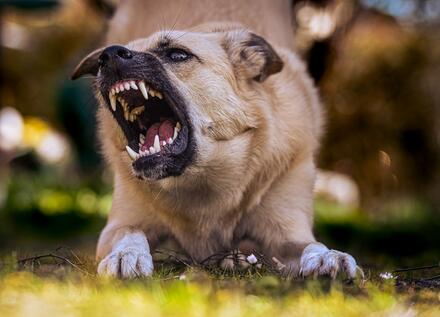
Unprovoked dog attacks by off-leash canines have been causing nationwide tension in the past months.
Many argue for stricter regulations and restrictions upon dogs and their owners for a safer environment. However, there are also those who argue that the aggression of these dogs stem from continuous abuse by humans, and therefore first and foremost should come the legislature to protect stray canines.
A Korean prosecutor, who wished to remain anonymous, offered legal insight on the current situation regarding unprovoked attacks from off-leash dogs.
He expressed that the current laws regarding dog attacks in Korea are considerably vague, in terms of adequate punishment for the dog and its owner in the case of causing harm on other dogs and nearby humans.
There are legal fines put into place, but if the dog that inflicted harm runs away and cannot be traced, it is nearly impossible to enforce legal consequences on the responsible parties.
In fact, he emphasized that euthanasia, often the heat of the argument as it is seen by some as a violation of animal rights, is not legally possible to set into place under any circumstance.
The legal procedure is that the government makes the dog owner turn in a waiver of ownership of the canine, and therefore the disposal rights of the canine are transferred to the government. Following these steps, the government often decides to euthanize the dog due to further safety concerns.
The prosecutor named a canine registration system as a possible solution for the abrupt rise in unprovoked dog attacks.
“What many do not see is that a great number of these dog attacks come from dogs not properly trained or taken care of by their respective owners,” he explained. “In fact, statistics point out that many unprovoked dog attacks, especially in rural areas, are from stray dogs without any means of tracking down the owners.”
He stated that under a canine registration system enforced by law, dog owners will be made fully responsible for registering their pets. Furthermore, he expressed the need for a guideline for owners on a government level to prevent mistreatment and abuse of dogs.
Jeong Buyun, the Director of Operations at Beagle Rescue Network, expressed the need for a change in the perception and countermeasures of off-leash dog attacks.
Beagle Rescue Network is a private organization working to improve the welfare of laboratory and abandoned animals in South Korea.
The organization is engaged in activities such as the detection of unethical animal testing institutions and rescue of animals whose experiments have been completed. They currently operate a shelter for rescued laboratory animals, where they undergo rehabilitation and basic socialization before being adopted into regular homes. In addition, they strive to improve current domestic animal protection laws by rescuing various animals in abusive situations, including animal hoarding sites and neglected zoos.
Jeong believes the root of dog attack accidents lies in improper breeding environments and guardians who do not seek to properly train and contain their pet dogs.
She emphasized that most of these attacks are caused by rural dogs, who reside in an open yard all their lives, often tied to a short leash and unsupervised. This prevents them from forming emotional bonds with people as well as socializing with other animals. While being raised in such detrimental environments, they are prone to break free of their leashes and escape, which can lead to major accidents.
“Frequent dog bite attacks are not the only risk caused by the stray canines,” Jeong added. “Because these dogs often roam without proper medical treatment, they also increase the risk of contagious disease infection, as well as the exponential population growth due to mass reproduction.”
In Jeong’s eyes, fundamental improvement is needed so that animal breeding in current poor conditions is permanently prohibited. Animals, especially canines, that live their entire lives tied to a leash or confined to a small cage without regular walks and opportunities socialize undergo extreme stress. Consequently, dog bite accidents will occur repeatedly unless this recurring situation is improved.
She agreed upon the necessity of a pet registration policy, so that the guardian can be effectively identified and subjected to adequate legal consequences when such accidents occur, including compensation for damage suffered by the victim.
The dog in question, however, should be carefully evaluated by various experts to determine whether this behavior is due to inherent aggression or simply lack of social experience due to the inappropriate breeding environment. Currently, there is no such assessment method in place, and in the event of an accident, it looks as if the sole priority is to dispose of the offending animal.
“Even in the process of legal trials, a vicious criminal who committed murder is judged taking into account their unfortunate childhood, unstable emotional state, and whether there was an intention to harm the other person,” Jeong pointed out. “It is unreasonable to judge animals without such consideration, as if scrapping the car that caused a traffic accident would end the case, and these tragedies would never happen again.”

